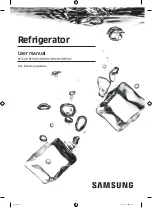
EN
24
6
Maintenance and cleaning
•
We recommend that you switch off
the appliance at the socket outlet
and pull out the mains plug before
cleaning.
•
Never use any sharp abrasive
instrument, soap, household
cleaner, detergent and wax polish
for cleaning.
•
Use luke warm water to clean the
cabinet of the appliance and wipe it
dry.
•
Use a damp cloth wrung out in
a solution of one teaspoon of
bicarbonate of soda to one pint of
water to clean the interior and wipe
it dry.
•
Make sure that no water enters the
lamp housing.
•
If the appliance is not going to be
used for a long period of time switch
it off, remove all food, clean it and
leave the door ajar.
•
Any dust that gathers on the
condenser, which is located at the
back of the appliance, should be
removed once a year with a vacuum
cleaner.
•
Check door seals regularly to ensure
they are clean and free from food
particles.
•
Removal of door rack
•
To remove door racks, remove all the
contents and then simply push the
door rack upwards from the base.
•
To remove a freezer drawer, pull
it as far as possible, and then tilt
it upwards, and then pull it out
completely.
•
To remove the freezer flap door, first
open the door 3” and then gently
pull it off. Make sure that the flap is
in place before closing the freezer
door.
•
Make sure that the special plastic
container (drain tray) at the back of
the appliance which collects defrost
water is clean at all times. If you
want to remove the tray to clean it
follow the instructions below :
•
Switch off at the socket outlet and
pull out the mains plug.
•
Clean the drain tray and wipe it dry.
•
Push the lug down with the tip of
a screw driver & pull out with a jerk
movement
•
Reassemble reversing the sequence
and operations.
•
Avoid spillage of food particularly
small items like rice, peas, beans
through the fan guard as they
may cause the cooling system to
block and therefore operate less
efficiently.
A
Never use cleaning agents or water
that contain chlorine to clean the
outer surfaces and chromium coated
parts of the product. Chlorine causes
corrosion on such metal surfaces.






































